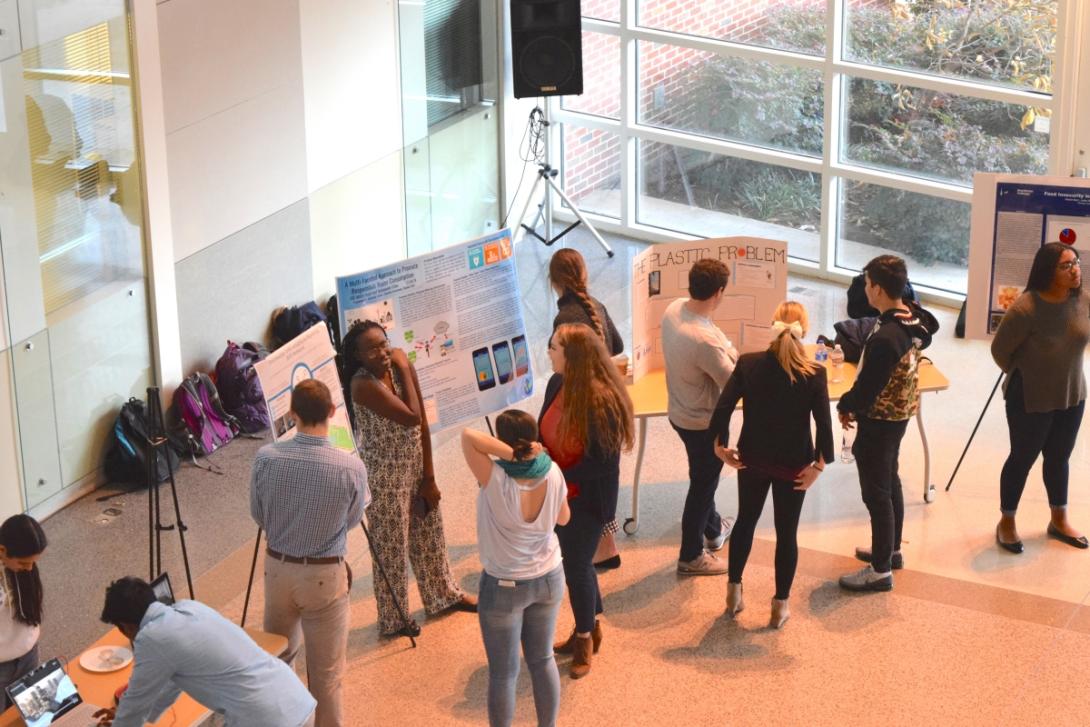
SLS is thrilled to announce the winners of its third Student Showcase. This semester’s showcase, held December 4th in Klaus Atrium, had 60 entrants, more than 130 attendees, and a wonderful diversity of projects. Our three winning projects are described below. The faculty recipients of the SLS Student Choice Award for Excellence in Teaching were Dr. Bethany Jacobs (Writing & Communication Program), Dr. Neha Kuma (Interactive Computing and International Affairs), and Dr. McKenna Rose (Writing & Communication Program).
Nominating students described the impact of their terrific teaching. Of Dr. Kumar’s class, students wrote “Neha Kumar is an incredible lecturer with a passion [about and] knowledge base [in] technology and poverty. Her classroom is designed to encourage discussion and to make students really think about big problems, especially creating sustainable communities” Dr. Rose’s students wrote, “Dr. Rose's passion in this topic has made me want to truly implement the solutions in our video to create sustainable communities.” Dr. Jacobs, wrote her nominators, “has inspired us all to explore the ideals of science fiction for visions of how we can create a more sustainable community for all.” Two of the following winners— Pravic and Zwaste—were in a pilot SLS program that links an upper-level engineering course, such as CEE 4803, with a section of ENGL 1101 or 1102. In this experimental pairing, Dr. Jacobs and Dr. Taylor visited each others’ courses and collaborated on a sustainable futures/ sustainable cities assignment that prompted students to make connections between humanistic and technical approaches to the creation of sustainable communities.
THIRD PLACE: Justin Prindle, “PRAVIC.” Instructor: Dr. Bethany Jacobs, ENGL 1102: Women in Science Fiction / Imagining Sustainable Futures. “In order to address the inherent bias present within human language, and to explore how language might help us to ameliorate the resulting systemic discrimination, I have constructed an artificial language as a recreation of the language of the Anarresti from Ursula Le Guin's "The Dispossessed." Since language is a system and the institution of society are fundamentally built on the basis of person-to-person interaction, the recreation of this language helps us to explore how such a language can affect our perception of the world around us, and how such a language can help to reveal our own inherent biases.
SECOND PLACE: Rachel Still, Maimuna Jallow, and Danielle Kronowski, “A MULTIFACETED SOLUTION THAT PROMOTES RESPONSIBLE WATER CONSUMPTION.” Instructor: Dr. John Taylor, CEE 4803: Smart and Sustainable Cities. “We created a smart phone application, and paired it with an educational outreach program to address the challenge of water supply insecurity and to hold consumers accountable for their role in water consumption. The smart phone application utilizes Advanced Metering Infrastructure (AMI) technology, which is the next generation of water meters. AMI replaces traditional meters with smart meters that have an embedded technological component that communicates through cellular connections and cloud computing to allow the water utility to track the water consumption of customers in real time. The application would ideally be used by water utilities as a service to allow the customers to track their water consumption daily, weekly, and monthly to promote consumption awareness. The application also allows users to track the water consumption of local businesses who opt to publish their water data as a proposed feature of the Water Savings Initiative within the Department of Energy’s Better Buildings Challenge. Through monitoring the amounts that commercial consumers are using, transparency will be increased among the community, and citizens can choose to either encourage or protest companies based on their responsible water usage.”
FIRST PLACE: Braxton Madison, Jesse Wu, Konrad Wang, Sandeep Bethapudi, “ZWASTE.” Instructor: Neha Kumar, CS 4745: Technology and Poverty. Zwaste (zero waste) is a mobile app that will alleviate some of the high demand on existing donation solutions, such as food banks or clothing centers, by enabling ordinary people to deliver donations directly to those in need. While current centralized donation distribution centers have many benefits, they also have weaknesses such as producing waste from insufficient storage space, long lines and understaffed volunteers who rush recipients rather than showing care, and inaccessibility to the elderly and handicapped. Zwaste fills in these weak areas by creating an “Uber for donations.” Our platform allows donors to list their donations, to pick their best match from a list of recipients, and then to personally deliver their donations with care. We also provide safety features such as ID verification and training videos for both donors and recipients. To transition donors from current social norms to Zwaste, our platform also has organizational Z-Drives for workplaces and schools to form donation drives and to track progress. Zwaste is about more than just zero waste of food, clothing, and school supplies. Zwaste is about zero waste of lives, empowering those in need to get back on their feet through empathy and care.
